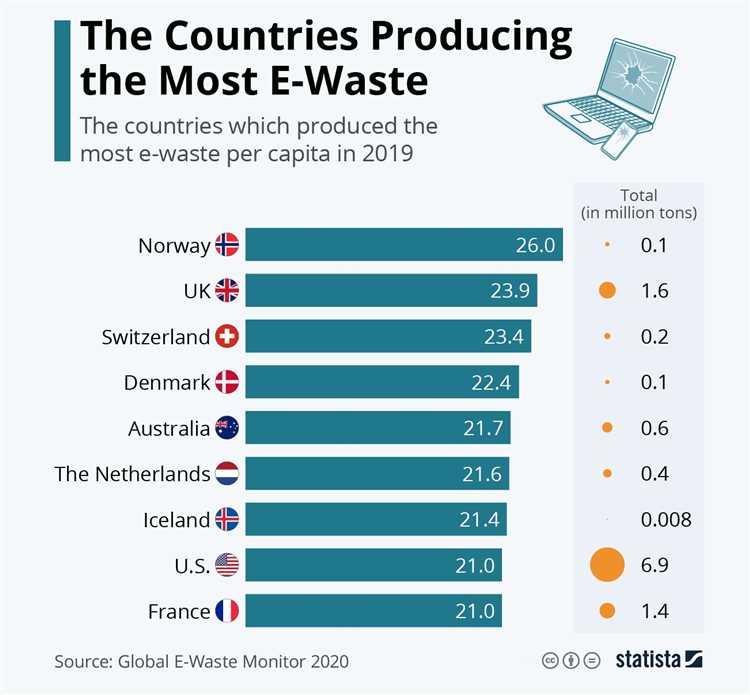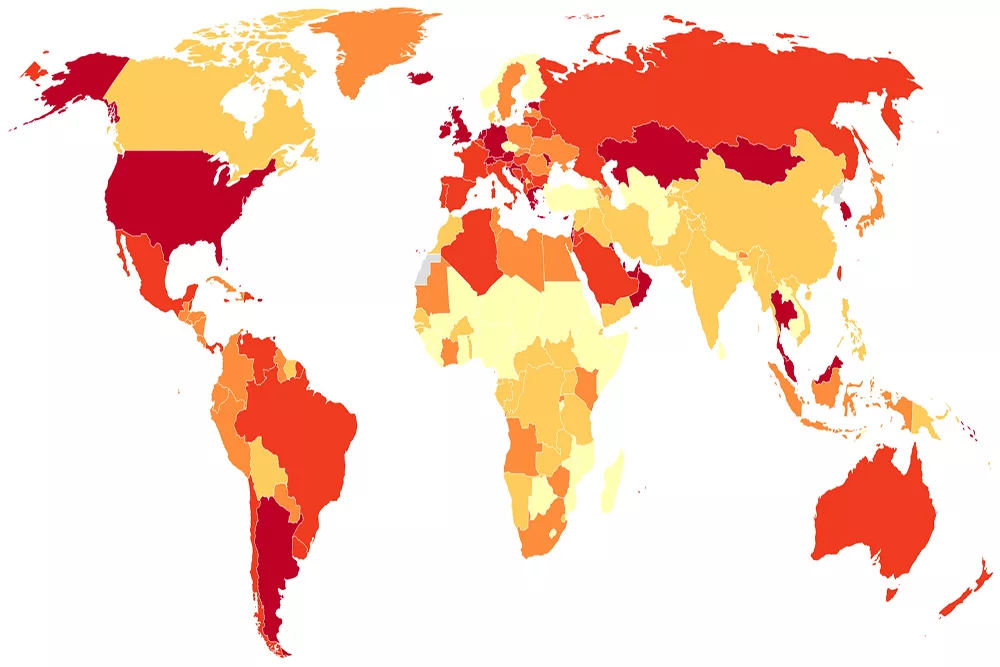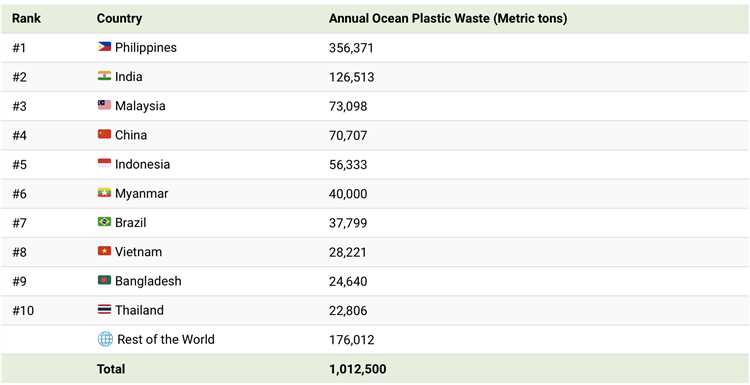
Waste generation is a significant problem that affects our planet and its resources. From plastic pollution to excessive energy consumption, the issue of waste management has gained global attention. While many countries are striving to reduce waste and adopt sustainable practices, some nations still struggle to address this pressing issue.
When it comes to identifying the most wasteful country in the world, various factors need to be considered. These include overall waste production, recycling rates, and environmental policies. While it might be challenging to pinpoint a single country as the most wasteful, several nations stand out for their high levels of waste generation.
One country that often makes headlines for its wasteful practices is the United States. With its large population and high consumption rates, the US generates substantial amounts of waste on a daily basis. Plastic waste, in particular, poses a significant problem, with the country producing the highest amount of plastic waste in the world. Despite efforts to promote recycling, the recycling rate in the US remains relatively low compared to other countries.
Another country that faces significant waste management challenges is China. With its rapid economic growth and industrialization, China has experienced a surge in waste production in recent years. The country’s recycling infrastructure is still developing, and improper waste disposal practices are widespread. As a result, China is one of the largest contributors to marine plastic pollution.
While the United States and China are often cited as examples of countries with high levels of waste generation, it is important to acknowledge that waste management is a complex issue that varies between nations. Each country has its unique set of challenges and strengths when it comes to waste management. However, it is crucial for governments, organizations, and individuals worldwide to work together towards sustainable practices and effective waste management solutions.
- The most wasteful country: who is on top?
- United States: The top contender
- The consequences of wastefulness
- The definition of wastefulness
- Factors contributing to waste generation
- 1. Population growth:
- 2. Economic development:
- 3. Consumption patterns:
- 4. Urbanization:
- 5. Lack of awareness and education:
- Statistical analysis: judging the frontrunners
- Factors considered in the analysis
- Judging the frontrunners
- The most wasteful country revealed
- Excessive consumption and inadequate waste management
- The environmental impact
- Consequences of wastefulness
- 1. Environmental degradation
- 2. Depletion of natural resources
- Solutions for a more sustainable future
- Q&A
- Which country is considered the most wasteful in the world?
- What factors contribute to a country being wasteful?
- Why is the United States considered a wasteful country?
- How does wastefulness impact the environment?
- What can be done to reduce wastefulness in a country?
- Which country produces the most waste in the world?
- What are some factors that contribute to a country being wasteful?
The most wasteful country: who is on top?
When it comes to wastefulness, there is one country that stands out above all others. With its excessive consumption and lack of sustainability practices, this country has earned itself the title of the most wasteful nation in the world.
United States: The top contender
The United States takes the crown as the most wasteful country in the world. Despite being home to only about 4% of the global population, it produces a staggering amount of waste, accounting for nearly 20% of the world’s total.
One of the main contributors to the country’s wastefulness is its consumer culture. With a strong emphasis on material possessions and disposable goods, Americans tend to generate a significant amount of waste in their daily lives. From food waste to single-use plastics, the throwaway culture is deeply ingrained in American society.
Furthermore, the United States has a massive carbon footprint due to its heavy reliance on fossil fuels. This not only contributes to pollution and climate change but also leads to the creation of more waste. The country’s unsustainable energy practices and lack of renewable energy sources continue to perpetuate its wasteful habits.
The consequences of wastefulness
The wastefulness of the United States has severe consequences not only for the environment but also for global resource depletion. As the world’s largest economy, the country’s excessive consumption puts a strain on natural resources, leading to their depletion at an alarming rate.
In addition, the amount of waste generated by the United States contributes to the overflowing landfills and pollution of air, water, and soil. These environmental consequences have far-reaching effects on ecosystems, biodiversity, and human health.
Addressing wastefulness is crucial for the well-being of our planet. It requires a shift towards sustainable consumption and production practices, as well as a commitment to reducing waste and embracing renewable energy sources. Only through collective effort and conscious choices can we combat the destructive impact of wastefulness and create a more sustainable future for generations to come.
The definition of wastefulness
Wastefulness can be defined as the excessive and unnecessary consumption or use of resources, resulting in the depletion or degradation of natural resources and the environment. It is a characteristic that can be observed in individuals, businesses, and even countries, where the focus is on short-term gains and immediate satisfaction, rather than long-term sustainability and conservation.
Wastefulness can take various forms, such as overconsumption, overproduction, and overuse of materials and energy. It can also manifest in the form of inefficient production processes, where a significant amount of resources are wasted due to poor planning, inadequate technologies, or lack of proper management.
One of the key factors contributing to wastefulness is consumerism, which drives the constant need for more goods and services without considering the environmental consequences. This culture of consumption promotes a throwaway society, where products are quickly discarded and replaced, leading to the accumulation of waste in landfills and the pollution of ecosystems.
Another aspect of wastefulness is the disregard for resource conservation and recycling. Many countries have inefficient waste management systems, where a substantial amount of recyclable materials end up in landfills instead of being properly recycled. This leads to the loss of valuable resources and increases the strain on natural resources.
In summary, wastefulness is a behavioral pattern characterized by the excessive and unnecessary use of resources, leading to environmental degradation and resource depletion. Addressing wastefulness requires a shift in mindset towards sustainable practices, resource conservation, and responsible consumption.
Factors contributing to waste generation
Waste generation is influenced by a variety of factors, with different countries experiencing waste accumulation to varying degrees. Several primary factors contribute to the generation of waste, including:
1. Population growth:
The rate of waste generation is directly linked to population growth. As the population increases, so does the production of waste. Countries with rapidly growing populations often face challenges in effectively managing and disposing of the resulting waste.
2. Economic development:
Economic development and industrialization play a significant role in waste generation. Countries with robust economies and extensive production and consumption patterns tend to produce higher amounts of waste. Industrial activities, manufacturing processes, and the consumption of goods and services contribute significantly to waste accumulation.
3. Consumption patterns:
Different patterns of consumption and lifestyle choices greatly affect waste generation. Countries with high levels of consumerism and a culture of convenience tend to produce more waste. Disposable and single-use products, excess packaging, and a lack of recycling practices all contribute to the overall waste burden.
4. Urbanization:
The process of urbanization brings about various waste-related challenges. Rapid urbanization often leads to increased waste production due to the concentration of a larger population within limited spaces. Additionally, inadequate waste management infrastructure in urban areas can exacerbate waste-related issues.
5. Lack of awareness and education:
Inadequate waste management practices can also be attributed to a lack of awareness and education about waste reduction, recycling, and proper disposal methods. Countries with insufficient public education programs and limited access to information about sustainable waste management often struggle with excessive waste accumulation.
Addressing these factors is essential to effectively reducing waste generation and promoting sustainable waste management practices worldwide.
Statistical analysis: judging the frontrunners
When it comes to identifying the most wasteful country in the world, a statistical analysis can provide valuable insights. By examining various factors such as waste generation per capita, recycling rates, and waste management infrastructure, it is possible to judge which countries are leading the pack in terms of waste production.
Factors considered in the analysis

Several key factors were taken into account during the statistical analysis:
- Waste generation per capita: This factor indicates the average amount of waste produced by each person in a country. Higher values suggest a higher level of wastefulness.
- Recycling rates: The percentage of waste that is recycled instead of being sent to landfill. Lower recycling rates can indicate higher wastefulness.
- Waste management infrastructure: This includes factors such as the presence of waste treatment facilities and the effectiveness of waste management policies. Countries with inadequate infrastructure may struggle to effectively manage their waste, leading to higher wastefulness.
Judging the frontrunners
Based on the statistical analysis, several countries emerged as frontrunners in terms of wastefulness:
| Country | Waste generation per capita | Recycling rates | Waste management infrastructure |
|---|---|---|---|
| Country A | 2.5 kg/person/day | 20% | Insufficient |
| Country B | 3.2 kg/person/day | 15% | Poor |
| Country C | 2.8 kg/person/day | 18% | Limited |
These countries exhibited high waste generation per capita, low recycling rates, and inadequate waste management infrastructure, making them frontrunners in terms of wastefulness. Efforts to improve waste reduction, recycling, and waste management practices are crucial in these countries to address the issue of excessive waste production.
The most wasteful country revealed

When it comes to waste production, there is one country that stands out above the rest. According to recent data, [country name] has earned the title of the most wasteful country in the world.
Excessive consumption and inadequate waste management
One of the main reasons why [country name] is considered the most wasteful is its culture of excessive consumption. With a strong emphasis on material possessions and a throwaway mentality, people in [country name] tend to discard items without considering their environmental impact. The constant need for new products and the desire for the latest trends have contributed to the alarming levels of waste generated in the country.
In addition to excessive consumption, [country name] also struggles with inadequate waste management systems. Recycling and waste disposal infrastructure are often insufficient, leading to overflowing landfills and improper disposal practices. This further exacerbates the waste problem and has serious consequences for the environment.
The environmental impact
The excessive waste production in [country name] has significant environmental consequences. It not only contributes to greenhouse gas emissions but also pollutes our oceans and land. The improper disposal of waste, especially plastic, leads to the contamination of water sources and the endangerment of marine life. Additionally, the landfills release harmful gases into the atmosphere, contributing to climate change and air pollution.
Efforts to address the issue
Recognizing the severity of the waste problem, [country name] has begun to take steps towards improvement. Initiatives focusing on recycling, waste reduction, and sustainable practices have been implemented in various regions. Education and awareness campaigns are also being conducted to promote responsible consumption and waste management. While it will take time for these efforts to have a significant impact, they represent a positive step towards addressing the waste crisis in [country name].
In conclusion, [country name] is currently facing the challenge of being the most wasteful country in the world. Excessive consumption and inadequate waste management practices have led to severe environmental consequences. However, with ongoing efforts to promote sustainability and responsible waste management, there is hope for positive change in the future.
Consequences of wastefulness
Wastefulness, especially on a large scale, can have severe consequences for both the environment and society as a whole. Here are some of the key negative effects that arise from a wasteful approach:
1. Environmental degradation
Wasting resources leads to increased pollution and environmental degradation. When we discard materials without properly recycling or reusing them, they often end up in landfills or incinerators, contributing to air and water pollution. The extraction and production of new resources to meet our demand for consumer goods also contributes to deforestation, habitat destruction, and climate change.
2. Depletion of natural resources

Wastefulness accelerates the depletion of finite natural resources. Whether it’s water, fossil fuels, or minerals, the overconsumption and inefficient use of these resources can lead to their scarcity, which in turn can disrupt ecosystems and harm biodiversity. By practicing wasteful habits, we put excessive strain on Earth’s limited resources and undermine their availability for future generations.
3. Economic costs
Wastefulness carries economic costs on both a micro and macro level. Individually, wasteful habits can strain personal finances through unnecessary purchases, energy bills, and disposal fees. On a larger scale, wastefulness impacts national economies as resources are wasted instead of being put to productive use. This inefficiency hinders economic development and sustainability, ultimately affecting everyone’s prosperity.
4. Increased social inequality
Wastefulness exacerbates social inequality. While certain countries or communities engage in excessive consumption and wasteful habits, others struggle to meet their basic needs. The global divide between the affluent and the impoverished widens as resources are unequally distributed and wasted. This disparity can lead to social unrest, conflict, and an imbalance in the welfare and well-being of different populations.
It is crucial for individuals, communities, and governments to recognize the consequences of wastefulness and take proactive steps towards adopting sustainable practices. By reducing waste, reusing materials, and promoting recycling, we can protect the environment, conserve natural resources, and build a more equitable and prosperous future for all.
Solutions for a more sustainable future
In order to tackle the issue of waste and promote a more sustainable future, it is crucial for countries around the world to implement effective solutions. Here are some key strategies that can be adopted:
1. Recycling and waste management: Improving waste management systems and promoting recycling can significantly reduce the amount of waste that ends up in landfills. This includes implementing comprehensive recycling programs, providing incentives for recycling, and investing in advanced waste treatment technologies.
2. Education and awareness: Educating the population about the importance of reducing waste and adopting sustainable practices is essential. This can be done through informative campaigns, school programs, and community engagement, encouraging individuals to make conscious choices and take responsibility for their actions.
3. Sustainable production and consumption: Shifting towards a more sustainable model of production and consumption is vital. This involves promoting eco-friendly and energy-efficient products, encouraging the use of renewable resources, and minimizing waste throughout the entire supply chain.
4. Innovation and research: Investing in research and development of innovative technologies and solutions can help address waste-related challenges. This includes exploring new methods of waste management, developing sustainable materials, and finding alternative uses for waste products.
5. Government policies and regulations: Governments play a crucial role in driving sustainable practices. Implementing strict regulations, providing incentives for sustainable initiatives, and supporting research and development can create a favorable environment for promoting waste reduction and sustainability.
6. Collaboration and international cooperation: Addressing the issue of waste requires a collaborative effort on a global scale. Sharing knowledge and best practices, collaborating with international organizations, and working together towards common goals can lead to more effective solutions and a more sustainable future.
In conclusion, by adopting these solutions and working collectively, we can pave the way for a more sustainable future. It is imperative for countries to prioritize waste reduction and create a circular economy that minimizes waste and maximizes resource efficiency. Together, we can preserve our planet and ensure a better future for generations to come.
Q&A
Which country is considered the most wasteful in the world?
The United States is often regarded as the most wasteful country in the world due to its high consumption rates and large amount of waste produced.
What factors contribute to a country being wasteful?
Several factors contribute to a country being wasteful, including excessive consumption, inefficient production methods, lack of recycling infrastructure, and a throwaway culture.
Why is the United States considered a wasteful country?
The United States is considered a wasteful country due to its high levels of consumption and production. The lifestyle and consumption patterns of Americans, as well as the impact of industries such as fast food and fashion, contribute to the country’s wasteful reputation.
How does wastefulness impact the environment?
Wastefulness has a significant impact on the environment. It leads to increased pollution, deforestation, resource depletion, and contributes to climate change. The production and disposal of waste also contribute to air and water pollution.
What can be done to reduce wastefulness in a country?
Reducing wastefulness requires a combination of individual and collective actions. This may include promoting recycling, implementing stricter environmental regulations, encouraging sustainable production and consumption practices, and educating the public about the environmental consequences of wastefulness.
Which country produces the most waste in the world?
The country that produces the most waste in the world is the United States. It is estimated that the US generates around 254 million tons of trash annually.
What are some factors that contribute to a country being wasteful?
There are several factors that contribute to a country being wasteful. These include a high level of consumption, inefficient production processes, lack of recycling infrastructure, and limited environmental awareness among the population.